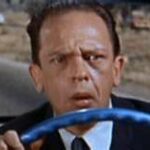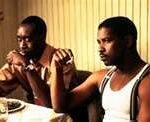Film and TV critics regularly write how, when used properly, the city of New York can become such an overarching presence in any film or show shot there, that it quite literally becomes a living, breathing character in the story.
 While that's certainly less the case with Los Angeles, don't for a minute think that the City of Angels doesn't have a vibe all its own, or that its vibe doesn't add both tone and texture to anything shot on location there.
While that's certainly less the case with Los Angeles, don't for a minute think that the City of Angels doesn't have a vibe all its own, or that its vibe doesn't add both tone and texture to anything shot on location there.
It's just that while New York and its many colorful neighborhoods are generally seen raw, unfiltered and at retail level, Los Angeles is generally portrayed through the windshield of a speeding car, from the comfort of a back yard pool, at courtside of a Laker game, or across the breach of some conspicuously well-situated lunch table.
That said, since nobody's bothered to do so, I've taken the liberty of selecting the 50 greatest movies of all time that not only take place in L.A., but which use the City of the Angels as an essential narrative element.
If you don't think Martha Coolidge's vastly underrated directorial debut about first love, clashing cultures and teenage peer pressure didn't leave it's mark on American society, and doesn't still resonate today, OMG, you haven't been paying attention, have you? LOL.
Granted, it boasts two of the most maddeningly earnest actors of all time in a youngish Jane Fonda and an aging Jack Lemmon (not to mention Michael Douglas, who's no slouch in the earnest department himself), but it's a hell of a thriller and in its day touched all the right buttons with the conspiracy-believing, Three Mile Island-fearing Mother Jones crowd.
 48. It's a Mad, Mad, Mad, Mad World (1963)
48. It's a Mad, Mad, Mad, Mad World (1963)
It's hardly the laugh-riot the producers intended it to be, but it is worth the price of admission if only for the hilarious moments provided by a handful of the comedic titans they rounded up for the cast -- if only in cameos -- particularly Don Knotts, Phil Silvers, Arnold Stang, Paul Ford, Jonathan Winters and the criminally underrated Dick Shawn.
Sometimes movies are weird for wierd's sake; almost as though they're trying to piss off viewers off by excluding them from some snarky little inside joke. But once in a while a movie will be weird with a real sense of heart; weird with the sincerest of intentions; weird for no other reason than because God made it that way. This is one such movie, and not only is Harry Dean Stanton his usual terrific self, but Tracey Walter's performance truly should have earned him an Oscar.
In David Rabe's long-winded but powerful 1984 Broadway play, the characters were Reagan-era narcissists, absolutely convinced that some combination of intellect, deal-making, amorality and white powder would guarantee them, if not personal fulfillment, then at least Hollywood success. By the time the movie got made 15 years later, however, it's as though the same characters, now observed through the prism of a decade's worth of post-Morning in America reality, are every bit as cynical and self-possessed. It's just that now they're not nearly so sure of themselves.
 45. Devil in a Blue Dress (1995)
45. Devil in a Blue Dress (1995)
As a writer, Walter Mosley has always been a little long on character and short on plot. This adaptation of one of his Easy Rollins books could have been so much better had the producers shown some huevos and not buried the scalding sexual tension between the story's leading man, who's black, and its alluring, exotic femme fatale -- who, as you might have guessed, is white. As it is, outside of its wonderful re-creation of a 40's-vintage L.A., the best thing about the film is the great Don Cheadle's turn as Easy's hair-trigger sociopath of a best buddy, Mouse.
Steve Martin's coyly cynical but loving little valentine to his adopted hometown has never received its due, in large part because it's a story by, for and about the West Coast cultural elite. But it's a charming, witty and eternally hopeful little fairy tale of a film that, like anyone who truly loves another person, is not afraid to point out, when need be, that he or she is walking around with toilet paper stuck to their heel, has forgotten to zip up their fly, or has a big piece of spinach wedged between their teeth.
It's not often you see Burt Lancaster playing a not-too-bright hunk, but that's exactly what he is here; an ex-con lured back to L.A. by the dripping sexuality and intoxicating allure of his bad girl of an ex-wife, played by Yvonne De Carlo. You don't need to know the plot. It's noir. Rest assured, the men will be men, the women will be untrustworthy, the lines between good and evil will blur beyond recognition, and at some point the fates will make sure that just about everyone you care for ends up holding the dirty end of the stick.
While it's not the Citizen Kane of 90's retro-chic cool, as some would have you believe, it is a fun little movie. Plus, it's worth seeing for two reasons: Vince Vaughn's star-making turn as a nocturnal, lounge-loving alpha dog, and the unforgettable late-night drunk-dialing scene in which Jon Favreau's character watches as one of the best nights he's had in months slowly, painfully, and irretrievably, spirals downward into a full-fledged train wreck -- all in the space of a half dozen or so ill-advised phone calls, one right after the other.
For years, I always thought to myself, if Robert Altman could skewer the "star maker machinery behind the popular (country) song" to the extent that he did in Nashville, imagine what he could do to Hollywood. After all, he didn't know the music industry the way he knew the film industry. But what I failed to consider was the fact that he remained an outsider in both worlds, which gave him not only critical distance, but perspective. And therein lies the secret to how he could compose such a dispassionate, coolly detached and ultimately non-fatal poison pen letter to the industry which made him both rich and famous.
No one is actually sure what this cryptic stew of atmosphere and attitude is all about, other than its got a handful of smoking-hot, ultra-cool babes -- one of whom works in a bookstore -- a few stiffs, a touch of blackmail, some crackling dialogue, and of course, Bogie and Bacall. But then again, what would you expect from a big-budget noir feature directed by Howard Hawks, with a screenplay by (among others) William Faulkner, and based on an original story by Raymond Chandler?
